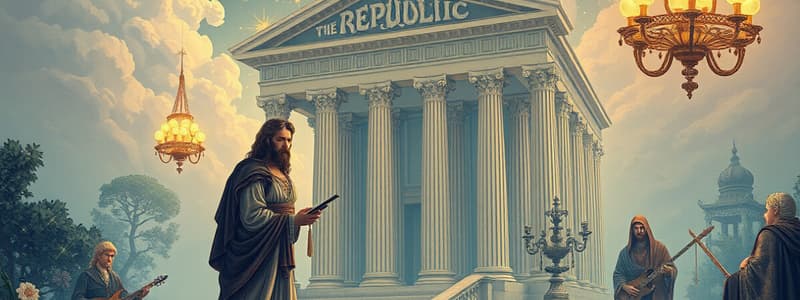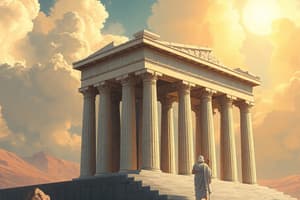Podcast
Questions and Answers
What are the three classes in Plato's just society?
What are the three classes in Plato's just society?
- Producers (correct)
- Handlers
- Warriors
- Guardians (correct)
What is the role of auxiliaries in Plato's just society?
What is the role of auxiliaries in Plato's just society?
Warriors responsible for defending the city and enforcing the guardians' convictions.
What does Plato believe about knowledge?
What does Plato believe about knowledge?
Knowledge pertains only to eternal, unchanging truths.
The intelligible realm can be sensed.
The intelligible realm can be sensed.
What is Socrates' rebuttal to Cephalus' definition of justice?
What is Socrates' rebuttal to Cephalus' definition of justice?
What is Thrasymachus' definition of justice?
What is Thrasymachus' definition of justice?
What are Glaucon's three types of goods?
What are Glaucon's three types of goods?
What is Socrates' view on poetry in Book 3?
What is Socrates' view on poetry in Book 3?
What does Socrates think of the portrayal of gods in Homer?
What does Socrates think of the portrayal of gods in Homer?
What are the four virtues of the state according to Plato?
What are the four virtues of the state according to Plato?
What is a just man according to Plato?
What is a just man according to Plato?
What is the myth of the noble lie?
What is the myth of the noble lie?
What is a timocracy?
What is a timocracy?
What distinguishes tyrants from regular men?
What distinguishes tyrants from regular men?
Why does Socrates ban all artists from his ideal state?
Why does Socrates ban all artists from his ideal state?
Socrates believes the soul is immortal.
Socrates believes the soul is immortal.
What happens to those who are just in the long run?
What happens to those who are just in the long run?
Flashcards are hidden until you start studying
Study Notes
Auxiliary
- Auxiliaries serve as warriors in Plato's just society, maintaining peace and defending against invaders.
- Their role includes enforcing the guardians' convictions and ensuring producers comply.
Guardian
- Guardians are the ruling class, selected from auxiliaries, embodying the philosopher-king concept.
- Their primary responsibility is governance and maintaining justice.
Knowledge
- Knowledge pertains solely to eternal truths; exemplified by mathematical truths, like 2+2=4.
- The intelligible realm, or the realm of the Forms, is the exclusive domain of knowledge.
Intelligible Realm
- Plato identifies two realms: the visible (sensible) and the intelligible realms.
- The intelligible realm encompasses Forms and abstract concepts, accessible only through intellect.
Cephalus' Definition of Justice
- Justice is defined as truth-telling and repaying debts.
- Socrates counters this by emphasizing the dangers of returning possessions to irrational or harmful individuals.
Polymarcus' Definition of Justice
- Justice involves benefiting friends and harming enemies.
- Socrates rebuts by asserting a just person does no harm, using a musician teaching poorly to illustrate the point.
Thrasymachus' Definition of Justice
- Justice serves the interests of the stronger; laws exist to benefit rulers.
- Socrates argues that rulers can err, thus laws may not align with their interests.
- Thrasymachus contends faulty rulers aren’t truly strong, leading Socrates to conclude that justice equates to wisdom and virtue.
Socrates on Injustice
- Collaboration is impossible among unjust individuals, leading to societal dysfunction.
Glaucon's Three Types of Goods
- Goods appreciated for themselves: harmless pleasures.
- Goods valued for both their own worth and their results: knowledge and health.
- Goods desired for their outcomes but not enjoyable in themselves: gymnastics and profit-making endeavors.
Glaucon and Socrates on Justice
- Glaucon categorizes justice as superior, desired for itself and its rewards.
- Many perceive justice as the least valued good.
Glaucon's Intent in Debating Injustice
- He advocates for injustice to challenge Socrates’ arguments for justice definitively.
Glaucon's Arguments for Injustice
- The origins of justice lie in the reluctance to suffer and inflict evil, viewing it as something chosen out of necessity.
- People act justly against their desires under societal pressure; Gyges' story exemplifies this notion.
- An unjust life offers greater rewards and recognition than a just life.
Socrates on Poetry in Book 3
- Poetry alleviates the fear of death, serving a positive role.
Socrates on Homer's Portrayal of Gods
- Critiques Homer for depicting gods unvirtuously, suggesting this corrupts moral behavior in society.
Socrates on Music
- Music is a tool for shaping citizens’ character, with specific harmonies promoting virtues like courage and temperance.
Socrates on Art
- Art should reflect beauty and virtue to strengthen societal morals.
Socrates on Physical Training
- Advocates balance in physical activity, emphasizing a healthy mind relies on a healthy body.
Socrates on the Neglect of the Body
- Suggests individuals who disregard physical health may not deserve care, reflecting a harsh view on personal responsibility.
Myth of the Noble Lie
- Citizens are born into distinct classes (Gold, Silver, Bronze), creating societal harmony through belief in a shared origin.
Four Virtues of the State
- Wisdom (Gold), Courage (Silver), Temperance (Bronze), and Justice are essential for a functioning society.
Wisdom in the Ideal State
- Rulers possess wisdom, crucial for effective governance and state management.
Courage in the Ideal State
- The soldier class embodies courage, understanding true dangers and prioritizing honor over fear.
Temperance in the Ideal State
- Citizens exhibit temperance, where rational control governs desires, ensuring societal harmony.
Definition of a Just State
- A just state features each class fulfilling its designated role without interference, promoting order.
Three Parts of Man
- Comprises the rational, irrational, and spirited parts, each requiring balance for a just individual.
Just Man
- A just individual fulfills roles of rationality, moderation, and spirited support, with reason as the primary guide.
Wave 1 of Book 5
- Advocates for equal training of men and women without bias, recognizing inherent differences in pursuits.
Wave 2 of Book 5
- Proposes a communal family structure through anonymous procreation, aiming for societal unity.
Wave 3 of Book 5
- Encourages class separation to align wisdom with power, fostering an ideal societal structure.
Ship Analogy
- Citizens often misjudge the philosopher-king's wisdom, mistaking knowledge for ineptitude in governance.
Philosophers as Kings
- Philosophers face public skepticism, primarily due to misperceptions equating intelligence with avarice.
Form of the Good
- The 'Good' represents ultimate knowledge, bridging the physical and intelligible realms, akin to the sun illuminating truth.
True Knowledge Acquisition
- Learning mathematics is fundamental for grasping true knowledge.
Types of Injust States
- Timocracy, Oligarchy, Democracy, Tyranny represent degenerated forms of governance.
Timocracy
- Governed by ambition, exemplified by historical contexts like Imperial Japan, promoting honor over moderation.
Oligarchy
- Ruled by the wealthy; economic disparity arises, with virtue often disregarded due to materialism.
Democracy
- A system of direct governance that can lead to chaos, prioritizing freedom at the decline of order.
Tyranny
- Absolute power emerges from democracy's excess, leading to corruption and suppression of dissent.
Tyrants vs. Regular Men
- Tyrants embrace their base instincts continuously; regular individuals tend to suppress such impulses.
Three Types of Men
- Lovers of wisdom value truth above all; lovers of honor prioritize status; lovers of gain focus on wealth.
Best Type of Man
- Philosophers rank highest, prioritizing wisdom over other pursuits due to their profound understanding of truth.
Pleasures of the Rational Part
- Rational pleasures yield true happiness, contrasting with transient desires leading to pain.
Socrates' Stance on Artists in the Ideal State
- Bans artists due to their creations’ detachment from truth, fostering misrepresentation.
Socrates' View on Poets
- Rejects poets for their double-layered imitation of truth, which corrupts the audience and society's moral fabric.
Immortality of the Soul
- Socrates asserts the soul's immortality, countering beliefs in its mortality.
Long-term Consequences for the Just
- Just individuals endure hardships yet ultimately achieve a fulfilling and virtuous existence.
Studying That Suits You
Use AI to generate personalized quizzes and flashcards to suit your learning preferences.




